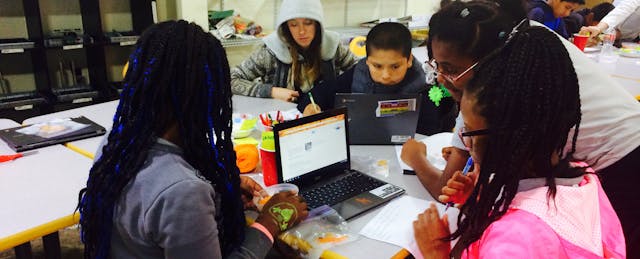Students are marching through the school hallways and chanting “Shut it down! Shut it down!” “No more upgrades!” Is this nonsense? Chaos? A failed experiment? How about a deep learning experience?
At Epic Middle School in Oakland, CA, (part of the Education for Change charter network), this is intended to be a regular reality. One key component of the Epic model is that students engage in Quests, which, depending on the audience, can be described either as interactive learning challenges or live-action role plays. The point, however, remains the same - students apply their learning and demonstrate mastery of standards in creative ways.
The idea behind Epic, a first year school with 170 sixth graders, was fleshed out during a Startup Weekend event. The result was a personalized, blended, gamified, STEAMeD, mastery-based school designed around a narrative of students as heroes in their own academic & social-emotional journey. Admittedly, this was a mouthful of buzzwords, but it is beginning to come to fruition.
The above scene was the (unexpected) result of a three-day Quest where students played citizens of a deeply stratified post-human community called Techtopia. Their goal was to obtain sponsorship from a corporation like “Apploid” by virtue of completing tasks and earning bits (i.e. money). Each student was a member of one of four different species, like “progenitors,” with varying levels of privilege and ability.
Throughout the three days, students were faced with content-related tasks, such as developing a travel brochure. Or, as one Epic lesson put it: “Welcome to the facebot…To gain our sponsorship you must show us that you can sell anything.” Students ultimately earned scores on a rubric assessing skills such as research, collaboration, and persuasiveness. In the moment, however, they were working to earn bits that could lead to upgrades (designed by students in the Epic Makerspace) that could then lead to being able to visit the disco.
Yes, the Quest at Epic included a disco. This was a fun outlet for students, and also, a lesson in privilege and class, as students exclaimed, “What do you mean progenitors don’t have to pay to enter the disco!? That’s not fair!”
The Quest design also included a series of puzzles that students could solve to “win the Quest” and unlock equity. While some students kept working on these puzzles, a larger contingent chose to seek equity in an entirely different manner: revolt.
The revolution was actually a surprise to the Epic staff, and led to important discussions regarding culture and behavior, as well as broader discussions regarding class and the efficacy of recent protests against aggressive policing—a subject intimately familiar to the community which Epic serves (blocks away from the Fruitvale BART Station in Oakland, CA).
Principal Michael Hatcher states that the ultimate goal of Epic is to provide a safe space for students to come to a deeper realization of who they are as a person, how they relate to others, and how they relate to society; to help students empower themselves and to ultimately empower their community. Epic was created to counteract prevailing narratives in the community—both the external street narrative and the school-based narrative around education being boring and irrelevant.
During the Quest, you could see the engagement in students’ faces. Sure, some were just excited about the arcade or disco, but others preferred the science experiments the most, or likened their situation to Percy Jackson, an English language arts reading from earlier in the school year. You could hear unprompted conversations you don’t hear every day: “I don’t want to shut it down, I want to do my lessons….where will we go if you shut it down?” According to Ms. James, a Math teacher, “The students were more engaged and were actually helping each other more.” Mr. Naghiyev, another instructor, said “You realize how bright and assertive some of the students are.”
In this first year, Epic has focused on building culture through an integrated social-emotional curriculum and gamified elements such as badges and a graphic novel student handbook. (On the first day of school, students had to solve a puzzle to figure out their class schedule.) Other components of the model, such as blended learning leading to more flexible personalized learning, are still being realized. Epic has seen strong culture-based outcomes, such as attendance, discipline, and student mood (tracked weekly), and will be assessing student academic growth via the NWEA MAP assessment at the end of the year. In addition, students are starting to own their data and goals; they track their points in the Illuminate SIS student portal and their blended and social-emotional data via an in-house Google-sheets based student data tracker. Much hard work remains, though the goal is to develop self-directed learners and to develop Quest cycles that could be shared with the broader education community.
A next step for Epic is to design more intensive week-long Quests that are the culmination of a trimester long integrated learning journey (the Quest cycle). Each Quest cycle would include authentic assessments with more student choice and would build upon themselves. Next year the theme will be “Oakland in the 1960s.” In the first trimester, students will focus on understanding that environment; in the second, they will better understand their individual character (e.g. the government, Black Panthers); and in the third, students will be focused on resolving a conflict—perhaps one that they themselves will generate. If this year was any indicator, it is a task for which they should be well prepared.


